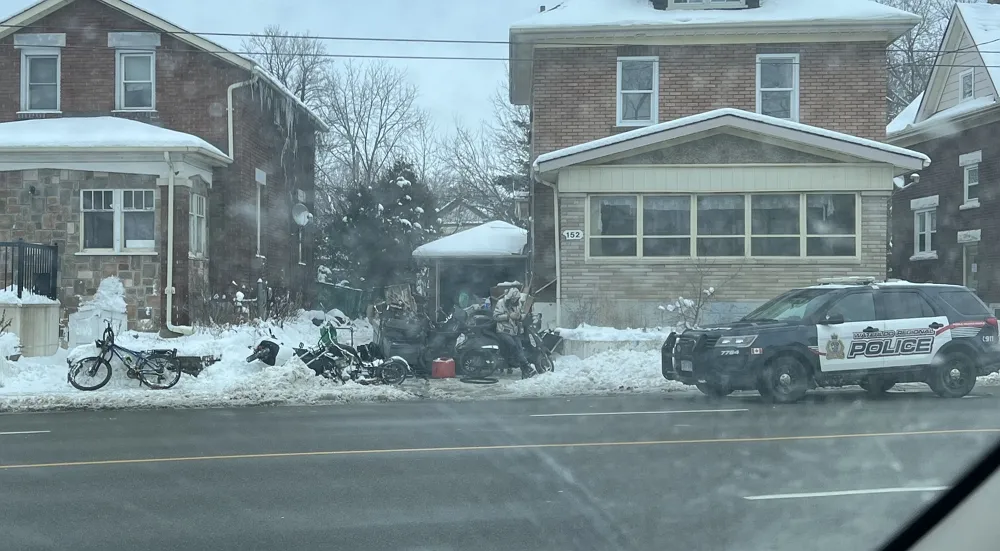This is part two of a two part story. If you’ve missed part one, please click here to catch up.
It’s not first time Subhra’s tenants have run afoul with their landlord. In a story for The Record by Liz Monteiro, Elizabeth and her husband Holden are described as poor and in a difficult position because “her family can’t afford to buy food.” The reality portrayed by this article is the down-on-their luck Holdens are being set upon by an aggressive system and a mediation process that may not have their best interests in mind.
The reality of these stories is that deep systemic issues cannot be portrayed in what amounts to 1,000 words. The Holdens, led by their matriarch live like hoarders. Left behind in their wake are signs that they are tinkers, so as a group they tended to keep parts of everything from projectors to computers to alarm clocks. The sheer clutter of living like this leads to incredibly unsafe conditions and clear fire hazards. But, this isn’t just one person, this is the entire family. Couple that with constant trips to fast food restaurants and you have cups and wrappers on the floor forever. This family may be poor financially, but they were of poor mental function also. Outcomes for families like this tend to be harder to track, and even worse, difficult to understand if a fire were to occur in these conditions and no one knows what was going on. The reality: A one-note description like “poor” is nothing but a caricature for problems that stem from serious mental and physical disabilities that our society has little ability to address.
All of this is to say that mental health outreach should not fall on a landlord. Very few landlords are physiologists, mental health outreach workers or crisis supporters. Forcing them to face the burden of these problems without any state supports are dangerous for everyone involved. When the authorities ignore small landlords, it leaves the bad tenant only to escalate their behaviour.
Back to eviction day and things are becoming tense. The sheriff has moved on. The tenants are illegally parked on busy Weber Street in front of Subhra’s house and have arrived to move several dump trucks of belongings with only a small jeep. They’ve clearly indicated they intend to occupy as long as possible. The police have been called, but are yet to arrive. Since no one is making an overture, a calm has set over everyone, until the upstairs tenant comes downstairs to move his car.
This sets off a chain of events. Howard needs to move his Jeep to let this car out of the driveway. He plans to occupy this parking space. Subhra’s son acts and moves his car into a diagonal position on the driveway. Subhra’s paralegal also steps out in front of the jeep, blocking its access to that driveway position, a risky move. The rest of us flood into the driveway to hold our ground. Howard stops his Jeep after moving mere feet and furiously steps out into the driveway in a rage.
His first attack is the paralegal. He gets into her face screaming expletives while she turns away from him. He follows her gaze screaming. He then comes at me pointing his finger “Shut up, you’re nobody,” on his way to where Subhra is still on the phone with the police. The son, Matthew, who had been near the garage then walks back to the Jeep screaming, “YOU’RE ALL GONNA DIE!.” Elisabeth, the mother, starts chirping expletives. This, of course, is all caught on tape.
When the police finally arrive, the two groups are split. The tenant’s pivot to needing medication and eventually gain access in a tense dance of complaints, belligerence, disrespect, property movement, and having police force them out. This process plays out each hour of the allotted 72 hours the tenants must move out. Their interest in pushing the limits of every interaction is evident.
This hits a boiling point on the last day. A full day longer than Subhra was legally required to give. A disagreement between the mover Howard hires and Subhra erupts into a shouting match. Howard then rushes at Subhra and his son and hurls the cup of coffee in his hand directly at Subhra. This coffee, thankfully, is cold. This too is recorded. What follows are some discussions with the police and an eventually assault charge against Howard. He’s later arrested for this.
Right to the very end, the Holdens held on to Subhra’s home. Using a mix of pushy tactics, delays, and downright bizarre behaviours, the tenants continued to cause trouble.
On the final day I returned to assist Subhra and what I saw was just sad. The police arrived another of many times to find the son, Matthew, dragging tool boxes, a motorcycle, a scooter and other objects that would eventually block the driveway. This is now far past the 72 hours and the police officer is indicating that Matthew has to place these objects on the sidewalk, or have them removed. Matthew opts to give up everything in the driveway and walks away dragging a stripped down motorcycle across the busy Weber Street almost getting himself hit by a car.

This leaves Jason, the man tasked at cleaning the junk parked and really to load while Matthew has disappeared into Kitchener. The officer makes it clear that everything in the driveway can go, so Jason and his helper take it. What follows is more than ten truck and trailer loads to finally get all of the refuse out of the house. Consider that this is still after the tenants made use of three days to remove their belongings.
Finally, Subhra had his home back the tenants could not return or they’d be charged with trespassing. This is what the tenants left behind.
The installed cameras prove to be very effective. Given that they pointed at the front door , porch area and side entrance to the units, entry by the former tenants was visible from multiple directions. Once the Holden would breach the property, Subhra only needed to call the police and they’d scatter or face trespassing charges. I suggested he install cameras in the backyard, another important point of access to the property. It’s a lesson that a simple camera setup on the outside of a unit can yield many benefits.
Fast forward to the first week of February and Subhra’s house is now looking more like its former self. The hardwood floors have been cleared to reveal several types of stains. The shadow of a fridge and stove remain to remind us of what filled these gaps in the kitchen. Insects that once thrived on putrid conditions must now face a fumigation. The ducts now needed to be cleaned. The living room is once again an expansive space that could one day invite another family. Subhra’s work isn’t over. There are concerns of fixing issues in the basement, plumbing, replacing lost appliances and recovering from the stress.
This ending for Subhra is a happy one for all SOLO members who have seen far too many disappointments in a system that supports ‘professional’ tenants. As the reality of this sets in, it’s clear that a landlord needs to be ready to face extremes. For landlords over 60 years of age, this is even further exacerbated. I’m happy to report that Subhra and family all met for a dinner weeks later and Subhra was looking revitalized. Here was a man who seemed many years younger thanks to a shave and apparent haircut. This was the first time I’d seen a sustained smile and laugh from Subhra since I first met him.
His ordeal is not over as there are other matters that need to be processed through the courts and tribunals, but Subhra has his home and life back.
SOLO Ontario is a non-profit organization fighting for small landlords in Ontario. We are here free of charge to help all small landlords. If you can, please donate to the cause. if you can, please share this story widely.

